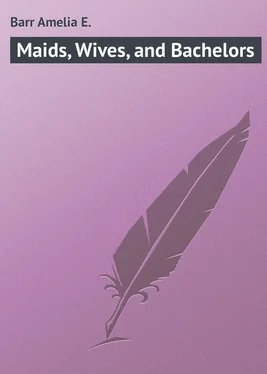Amelia Barr - Maids, Wives, and Bachelors
Здесь есть возможность читать онлайн «Amelia Barr - Maids, Wives, and Bachelors» — ознакомительный отрывок электронной книги совершенно бесплатно, а после прочтения отрывка купить полную версию. В некоторых случаях можно слушать аудио, скачать через торрент в формате fb2 и присутствует краткое содержание. Жанр: foreign_prose, на английском языке. Описание произведения, (предисловие) а так же отзывы посетителей доступны на портале библиотеки ЛибКат.
- Название:Maids, Wives, and Bachelors
- Автор:
- Жанр:
- Год:неизвестен
- ISBN:нет данных
- Рейтинг книги:5 / 5. Голосов: 1
-
Избранное:Добавить в избранное
- Отзывы:
-
Ваша оценка:
- 100
- 1
- 2
- 3
- 4
- 5
Maids, Wives, and Bachelors: краткое содержание, описание и аннотация
Предлагаем к чтению аннотацию, описание, краткое содержание или предисловие (зависит от того, что написал сам автор книги «Maids, Wives, and Bachelors»). Если вы не нашли необходимую информацию о книге — напишите в комментариях, мы постараемся отыскать её.
Maids, Wives, and Bachelors — читать онлайн ознакомительный отрывок
Ниже представлен текст книги, разбитый по страницам. Система сохранения места последней прочитанной страницы, позволяет с удобством читать онлайн бесплатно книгу «Maids, Wives, and Bachelors», без необходимости каждый раз заново искать на чём Вы остановились. Поставьте закладку, и сможете в любой момент перейти на страницу, на которой закончили чтение.
Интервал:
Закладка:
Barr Amelia E.
Maids, Wives, and Bachelors
Maids and Bachelors
Women who have devoted themselves for religious purposes to celibacy have in all ages and countries of the world received honor, but those upon whom celibacy has been forced, either through the influence of untoward circumstances, or as a consequence of some want or folly in themselves, have been objects of most unmerited contempt and dislike. Unmerited, because it may be broadly asserted that until the last generation no woman in secular and social life remained unmarried from desire or from conviction. She was the victim of some natural disadvantage, or some unhappy circumstance beyond her control, and therefore entitled to sympathy, but not to contempt.
Of course, there are many lovely girls who appear to have every advantage for matrimony, and who yet drift into spinsterhood. The majority of this class have probably been imprudent and over-stayed their market. They have dallied with their chances too long. Suddenly they are aware that their beauty is fading. They notice that the suitable marriageable men who hung around them in their youth have gone away, and that their places are filled with mere callow youths. Then they realize their mistakes, and are sorry they have thought being “an awfully silly little thing” and “having a good time” the end of their existence. Heart-aches and disappointments enough follow for their punishment; for they soon divine that when women cease to have men for lovers, and are attended by school-boys, they have written themselves down already as old maids.
Closely allied to these victims of folly or thoughtlessness are the women who remain unmarried because of their excessive vanity – or natural cruelty. “My dear, I was cruel thirty years ago, and no one has asked me since.” This confession from an aunt to her niece, though taken from a play, is true enough to tell the real story of many an old maid. Their vanity made them cruel, and their cruelty condemned them to a lonely, loveless life. Close observation, however, among the unmarried women of any one’s acquaintance will reveal the fact that it is not from the ranks of silly or cruel women that the majority of old maids come. Men do not, as a rule, dislike silly women; and by a wise provision of nature, they are rather fond of marrying pretty, helpless creatures who cannot help themselves. Neither are cruel women universally unpopular. Some lovers like to be snubbed, and would not value a wife they had not to seek upon their knees. There are, therefore, always chances for the silly and cruel women.
It is the weak, colorless women, who have privately strong prejudices, and publicly no assertion of any kind, that have, even in youth, few opportunities. They either lack the power to love strongly or they lack the power to express their feelings. They have not the courage to take any decided step. They long for advances, and when they are made, recoil from them. They are constitutionally so timid that they fear any step or any condition which is a positive and final change. If marriage had some reservations and uncertainties, some loopholes through which they could drag themselves as a final resort, they would be more sure of their own wishes. These are the Misses Feeble-minds, who cast the reproach upon feminine celibacy.
They feel that in some way they have been misunderstood and wronged, and they come finally to regard all other women as their enemies. They worry and fret themselves continually, and the worry and fret sharpen alike their features and their temper. Then their condition is precisely the one most conducive to complaining and spiteful gossiping; and they fall, in their weakness and longing for sympathy, to that level. Thus to the whole class is given a reputation for malevolent railing which does not by any means belong to it. In fact, married women are generally more venomous than old maids. The words of married women have greater weight, and they do more harm; for they can make suggestions and accusations which an old maid could not make with any propriety. An old maid’s gossip is generally without intentional malice; she has nothing to do, and she wants to make herself agreeable; while married women, having plenty else to do, must, as a general thing, talk scandal from pure ill-nature.
There is a large majority of old maids who are to be sincerely respected, and from whose numbers men with sense and intelligence may choose noble wives. They are the pretty, pure, sensible women who have been too modest, and too womanly, to push and scramble in the social ranks. They have dwelt in their own homes, and among their own people, and no one has sought them out. They have seen their youth pass away, and all their innocent desires fade, and they have suffered what few can understand before they reached that calm which no thought of a lover troubles. Sweet faded flowers! How tenderly we ought to regard these gentle victims of those modest household virtues which all men profess to admire, but which few seem desirous to transplant into their own homes.
Another class, somewhat kindred to this, is composed of women who have never found their ideal, and have never allowed themselves to invent for any other man those qualities which would elevate him to their standard. And these women, again, are closely allied to those who remain unmarried because they do not, and will not, conform to conventionalities and social rules. They are clever and odd, and likely to remain odd, especially if they refuse to men – as they are most likely to do – that step or two in advance which is the only way to reconcile them to witty or intellectual women.
These varieties of unmarried women are mainly the victims of natural peculiarities, or of circumstances they are not responsible for. But within the last generation the condition of feminine celibacy has greatly altered. It is a fact that women in this day, considerately, and in the first glory of their youth, elect themselves to that condition. Some have imbibed from high culture a high conception of the value of life, and of what they ought to do with their lives; and they will not waste the days of their youth in looking for a husband in order to begin their work. Others have strong individuality, and refuse to give up their time into another’s keeping. The force of character displayed by such resolutions naturally leads to celibacy. No one but a very weak man would be attracted by women of such vital purpose, and weak men would not be tolerated by such strong women.
The wise and the thoughtful may well give such voluntary old maids the full credit of their purpose, for the generality will not believe in resolutions so much above their own consciences and intelligence. They will still sneer at their condition, and refuse to admit that it is of choice. They will throw at them that wearisome old fable of the fox and the grapes, when they might much more correctly quote Sappho’s song of the ripe apples left on the topmost branches of the apple-trees: “Not because they were forgotten of the gatherers, but because they were out of their reach .”
In accord with the fresh development, we are told that the number of unmarried women in the country is steadily on the increase. But this increase will not be ranged among the silly, the weak, or the cruel of the sex. It will come from that class of women whose eyes have been opened by the spread of education and refinement; women not afraid to work for themselves, and who indeed have thoughtfully concluded that their own efforts and their own company will be far better for them than the help and company of any man not perfectly in sympathy with them, or their inferior either in moral or mental calibre. For it is not always a duty to marry; but it is always a duty to live up to our highest conception of what is right and noble and elevating.
Читать дальшеИнтервал:
Закладка:
Похожие книги на «Maids, Wives, and Bachelors»
Представляем Вашему вниманию похожие книги на «Maids, Wives, and Bachelors» списком для выбора. Мы отобрали схожую по названию и смыслу литературу в надежде предоставить читателям больше вариантов отыскать новые, интересные, ещё непрочитанные произведения.
Обсуждение, отзывы о книге «Maids, Wives, and Bachelors» и просто собственные мнения читателей. Оставьте ваши комментарии, напишите, что Вы думаете о произведении, его смысле или главных героях. Укажите что конкретно понравилось, а что нет, и почему Вы так считаете.












